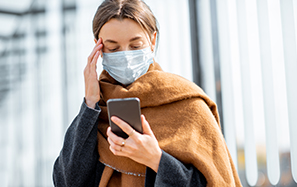We are collectively committing hara-kiri The theme is that there is a complete mismatch between the threat of the virus and the measures taken in many countries. Actually, macroeconomist Lars Juning best describes this with the expression “We are collectively committing hara-kiri”. He wrote a report for the EU in 2006 on the economic impact […]
Lees volledig artikel: We are collectively committing hara-kiri
We are collectively committing hara-kiri
The theme is that there is a complete mismatch between the threat of the virus and the measures taken in many countries. Actually, macroeconomist Lars Juning best describes this with the expression “We are collectively committing hara-kiri”. He wrote a report for the EU in 2006 on the economic impact that a pandemic could have on the EU.
Because of the way governments are now reacting, the damage will be many times greater than he wrote in that report. He had not taken into account that many countries would be completely locked down, as in fact happened in the Netherlands.
If you really think, as the IMF has indicated, that economic growth in the Netherlands will only go down 8% this year, then you are living in dreamland. It gets much worse.
There is just a domino effect. If this crisis was only the case in one or two countries, the other countries could, as it were, pull those two countries out of the equation. But it’s the same everywhere. Soon Statistics Netherlands (CBS) will see by far the biggest drop in consumer confidence ever. And that also means a huge drop in consumer willingness to buy.
Confidence
Even if, with a magic wand, we could make sure that we would no longer have any restrictive measures from 1 June next, the economic devastation would still be enormous. Especially since consumer behavior will change dramatically as a result of everything we are now experiencing. Will people gave enough confidence in the future, to resume old spending habits? Plus that this lockdown also brings a revaluation of what is important in life and what is not.
And even if you value the latter positively, it will still have huge consequences. Not only economically, but also socially. Companies at home and abroad go bankrupt. Employment is lost en masse. Self employed people get (much) less work.
I wouldn’t be surprised if 10% or more of employment is lost in the Netherlands. I am convinced that this year the record number of bankruptcies will be exceeded.
This will also lead to sharply increasing social tensions within society at home and abroad, but also between countries. It is waiting for the first major looting by hungry people in a hopeless situation in one of the countries in the world. And can’t we skip that?
History has shown that such a major global crisis (wars, famines) often leads to many tensions and revolutions.
OMT
The problem is that the Outbreak Management Teams in most countries in the world, are occupied only by doctors and epidemiologists (just like in the Netherlands). These are expert and great people, who (rightly) focus on the delay in the spread of the virus from their field of expertise.
And fortunately now (and in almost all countries, by the way) we are seeing a weakening of that increase in new infections. Fortunately, we did not make it to the 2400 people in our Dutch ICUs. We are now at 1,200 and that number is falling every day. Even though there are still quite a few problems in the care institutions, partly because people do not understand the role of ventilation and air circulation in the spread of the virus.
This is also the explanation for the outbreaks on cruise ships and naval vessels. If so many people are infected at the same time, it is not because someone is infected, who then sneezes in the face of 500 others. That’s because of the aerosols floating around.
But no matter how acrimonious it may sound: precisely because there is unfortunately still a lot going on in the institutions, we do not notice that it is better under control outside those institutions than we already think.
Blind eye
That OMT and the government have a blind eye for an at least as important patient, who is also in the ICU and whose situation is critical: the Dutch economy and society. The Dutch economy and society are suffering major (and partly irreparable) damage.
It is high time that the OMT will expand to include people who know a lot about this important patient. And who understand that what Minister Wiebes proposes as a “1.5 meter society” is not only unfeasible, but also unnecessary. Nowhere in East Asia do you see such a nonsensical approach.
Look for example at how the Czech Republic has done the approach almost exemplary from the beginning. And on 18 March, for example, made mouth protection on the streets mandatory. With a population of 11 million, they have only lost an average of 3 people a day for the last three days! Do you think they continue as a 1.5 meter society?
The research of Peil.nl that will be published tomorrow, shows that a quarter of all workers indicate that it is impossible to work in their company/organization on the basis of a 1.5 meter society. And another 15% indicates that it is possible, but not without major consequences.
What Minister Wiebes has announced is unfortunately a proposal from a chamber scientist, who has little experience with what the real world looks like on a daily basis.
Come to their senses
I hope Prime Minister Rutte and his Cabinet will soon come to their senses. And that he will realize that this patient also needs attention and care. And that the consequences, if that patient does not recover well, will be many times more serious (also with regard to public health) than reducing the number of patients in the ICU with COVID-19.
We must quickly come up with an intelligent exit strategy that strikes the right balance between reducing the increase in COVID-19 patients and giving the economy and society air to breathe again. If we don’t do that, Lars Juning is right. Then we have committed hara-kiri.
To conclude an e-mail I received from a Dutchman from Phuket in Thailand. He gives the perfect example of the imbalance between the scale of the threat of the virus and the approach of governments. And this is the case in almost all countries.
Phuket, Thailand
“I’ve been living in Phuket, Thailand, for 20 years now, since 2001. My experiences here: April 17, 2020. Casualties in Phuket by Corona: 0, we’ve been in a Lock down for two weeks.
On March 17, 2020 (4 weeks ago) I spent another 4 hours in a government building, because we had to renew our driver’s license. Picture this government building: with 150-200 man waiting for hours in a building. Almost everyone has to stand because there are only 10 seats. Then you have to go into a classroom with a group of 60 people where they play a 50 min video.
Nobody was wearing a mask at that moment. The term “social distancing” was unknown.
Thousands of Chinese tourists have landed in Phuket every day since Nov-Dec. Jan, Feb. It’s full house. Hardly anyone in Phuket wore a mask in mid-March. We certainly had no shortage of Chinese people.
Spread of the virus almost zero (or a spread but without any symptom, we don’t know).
2 weeks ago everything closed down here. The death toll was still 0. Lock down, hardly allowed to leave my house, masks on the street are mandatory. No alcohol sales. Almost everything’s closed. Don’t leave or enter my neighborhood.
That’s when I saw your quote: “humidity above 80% the virus can’t spread.”
I don’t know if it’s true, but I’ll take it as “true” for now.
In Phuket, we hardly ever get below 80% humidity. https://weather-and-climate.com/uploads/average-relative-humidity-thailand-phuket.png
That’s outside on the street. So transfer probability is or falls to zero. And yet we’ve been in a Lock down for two weeks.”
You have just read: We are collectively committing hara-kiri.







